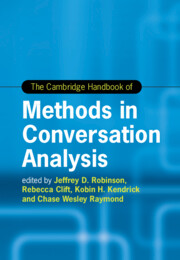Book contents
- Frontmatter
- Contents
- List of Tables
- List of Contributors
- Part I Introduction
- Part II Points of Departure
- 2 Conversation-Analytic Methods of Data Collection
- 3 Collecting Interaction Data in the ‘Lab’ versus the ‘Field’: Rationale, Ramifications, and Recommendations
- 4 Working with Data I: Field Recordings
- 5 Multimodal Transcription as Process and Analysis: Capturing the Audible and Visible
- 6 Discovering a Candidate Phenomenon
- 7 Data Sessions
- Part III Collections
- Part IV Evidence
- Part V Avenues into Action
- Part VI Situating and Reporting Findings
- Part VII Looking Forward
- Appendix I Jeffersonian Transcription Conventions
- Appendix II Multimodal Transcription Conventions
- Index
7 - Data Sessions
from Part II - Points of Departure
Published online by Cambridge University Press: 06 December 2024
- Frontmatter
- Contents
- List of Tables
- List of Contributors
- Part I Introduction
- Part II Points of Departure
- 2 Conversation-Analytic Methods of Data Collection
- 3 Collecting Interaction Data in the ‘Lab’ versus the ‘Field’: Rationale, Ramifications, and Recommendations
- 4 Working with Data I: Field Recordings
- 5 Multimodal Transcription as Process and Analysis: Capturing the Audible and Visible
- 6 Discovering a Candidate Phenomenon
- 7 Data Sessions
- Part III Collections
- Part IV Evidence
- Part V Avenues into Action
- Part VI Situating and Reporting Findings
- Part VII Looking Forward
- Appendix I Jeffersonian Transcription Conventions
- Appendix II Multimodal Transcription Conventions
- Index
Summary
Many conversation-analytic projects and published papers have their origins in phenomena discovered by those working together in data sessions. Many researchers encounter conversation analysis and learn its principles in such sessions. For those working where conversation analysis is taught, data sessions are a regular and indispensable part of the working week, part of the practice of conversation analysis itself, and a primary resource through which methods are taught and communities are built. They provide occasions at any point in the research cycle to examine data fragments together in a concentrated stretch of time. They present opportunities for novice and experienced researchers to appraise existing research findings and to learn from each other in the heuristics of making observations and developing arguments from those observations. Included in this chapter are practical suggestions for planning, leading, and participating in data sessions, and a set of ‘keys’ to different aspects of turn and sequence organization that can open up areas of analysis in a particular stretch of interaction. The chapter also highlights challenges regularly encountered, especially when working with different languages and when meeting remotely, and it outlines recent developments, such as new formats and technologies for enhancing in-person and remote data sessions.
Keywords
- Type
- Chapter
- Information
- The Cambridge Handbook of Methods in Conversation Analysis , pp. 172 - 188Publisher: Cambridge University PressPrint publication year: 2024

